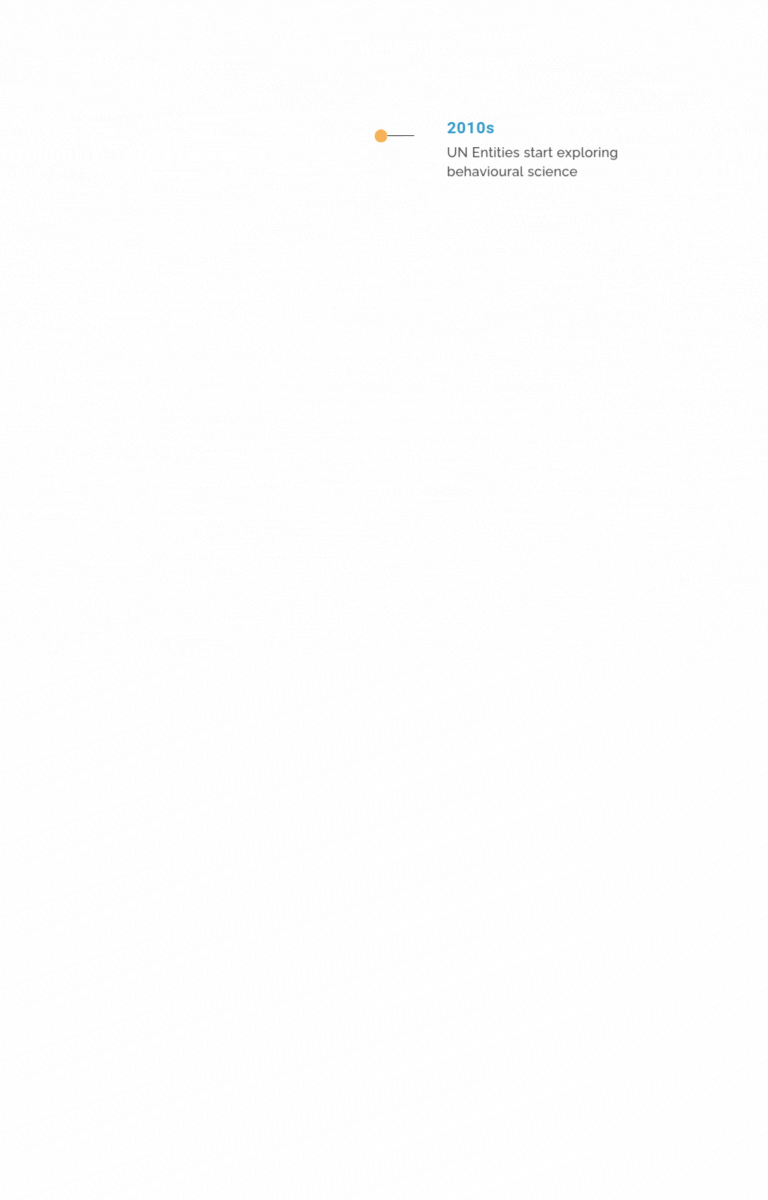
Our Story
Many policies and programmes designed to help achieve the Sustainable Development Goals require people, communities or decision makers to change their behaviours to generate impact. This could be attending a training or participating in a meeting, voting, saving money, taking medicine or allowing a child to go to school. If a programme fails to provide the necessary information or means to encourage the desired behavioural change the programme is unlikely to be successful.
Behavioural Science (BeSci) can help enable interventions to produce the desired behavioural change. Behaviourally informed interventions leverage what is known about human behaviour and decision-making, and invest in better diagnosing specific behavioural barriers and enablers to help people achieve their aims.
In the early 2010s, UN Entities began experimenting with and applying behavioural science to deliver on their mandates. Some early behavioural science experiences are reflected in a 2016 report on Behavioural Insights at the UN, which helped to further increase awareness about the potential of behavioural science to help achieve the Sustainable
Development Goals.
Over the last five years, the growth of behavioural science across parts of the UN system has been significant. Most of these efforts, however, have occurred in silos, with little systematic exchange between the individuals and Entities who were driving them and a heavy reliance on expertise from outside the UN system.
With the recent growth of behavioural science application to the Sustainable Development Goals, there has been a significant increased appetite for sharing and collaboration across UN Entities. Driven by the growing interest, the UN Behavioural Science Group of the UN Innovation Network fosters the application of behavioural science aross the UN system by promoting awareness, providing learning opportunities and encouraging exchange and collaboration among UN Entities.
Building on this momentum and in an effort to further support the adoption and mainstreaming of behavioural science across the UN, the Secretary-General published a Guidance on Behavioural Science in 2021.
Our Mission
Supported by the Executive Office of the UN Secretary-General and UN Innovation Network, UN Behavioural Science fosters the application of behavioural science to achieve impact in the UN and beyond.
I. Improve policy and programme effectiveness; and
II. Improve administrative support systems, policies and processes.
Our Vision
Our vision is a United Nations system that integrates behavioural science seamlessly into the fabric of our work: evidence-based, science-based, responsible, inclusive, gender responsive, context-adapted and effective. We see a future in which the United Nations system helps Member States in harnessing the power of behavioural science to craft interventions that tangibly improve outcomes and fast-track sustainable development progress for all.

Melissa Fleming
"Behavioural science insights are essential for us to define the communications tactics that could inspire change. They are the foundation of our approach and should be the cornerstone of every modern, data-based, impactful communications strategy or campaign."

Under-Secretary General
For Global Communications
Volker Turk
"UN 2.0 is about making the organisation fit for the future - agile, forward-thinking and effective. UN 2.0 is guiding the direction of the UN Human Rights Office, as we look ahead to the next 25 years and to ensuring human rights are the solution to humanity's biggest challenges."
United Nations High Commissioner
For Human Rights
Our Team
The UN Behavioural Science Team provides technical behavioural science advice and support to working and senior levels of the UN.
We have diverse backgrounds from behavioural science and management consulting to academia, policy, journalism and design. We are brought together by a passion for generating impact through better understanding human behaviour and leveraging research insights and methods.












